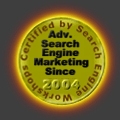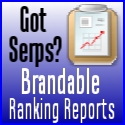 Look how old this is!
Look how old this is! I post at SearchCommander.com now, and this post was published 15 years 5 months 16 days ago. This industry changes FAST, so blindly following the advice here *may not* be a good idea! If you're at all unsure, feel free to hit me up on Twitter and ask.
Last night my kids had football practice, and I had an 8pm commitment too, but I wanted to attend last nights monthly SEMpdx event, which was David Mihm’s presentation on local search.
Recently, I’ve found myself working with some very small local businesses, and several sites for friends and casual acquaintances. I wanted to see what was new and important, so I blew off my family, and went to the presentation anyway. Nice, huh?
When I first tried to learn about the ranking factors for local search, I was verbally chastized by Erik Stein of Google in front of about 1200 people after I dared to ask out loud what the differences were between organic ranking and the local algorithm.
He claimed that “he wasn’t there to divulge the secrets of the Google algorithms” and basically made me look like an idiot for asking. Even at some of the other conferences I attended back then, it was very rare to find anyone that knew much about local, because most of the speakers were working with large companies on a national or worldwide campaigns.
Now today, just two short years later, I can get the specifics from a world class expert without even leaving Portland, and we got treated to a couple mentions of “that’s just changed in the last three weeks” which is always nice ;).
His presentation was basically an updated summary of his now famous local search ranking factors offering a whirlwind explanation of how to be successful with your local search marketing efforts – the “10 pack” of search results that comes up above the organic rankings in so many of todays searches.
He pointed out for those that didn’t already know, that the ranking factors for those listings were far different, and that basic SEO or even advanced SEO tactics were not enough, and pretty much, they are unrelated entirely when it comes to local search.
He then went through slide after slide of valuable information, and I’ve tried to pick out the nuggets that were most important to me, and I’ve listed them below.
Duplicate Content is Good
Match all of your listings across the web closely, even word for word. This goes not only for your business name and business description, but your phone number (don’t list tracking phone numbers!), and even your store hours, and credit cards accepted. etc. This gives your listings consistency, and the search engines see this duplication of information as a GOOD thing giving verification that you really are who you claim to be.
Beyond The Big Three
Besides claiming your business listing with the search engines, get the most bang for your buck and see quick results, ensure that you are also listed at Localeze, Info USA, and Acxiom.
Universal Business Listings
There’s a good way to submit to multiple places, one that only costs $30. I can tell you from experience myself that it’s quite efficient and effective, and that’s why I’ve been an affiliate of UBL – Universal Business Listings for a while now, and have already added all of my local clients and friends there.
Get Relevant Geographic Links
He very quickly mentioned that your inbound link profile should have a “geographic scent”, and while this doesn’t directly relate to your local business listings, it does relate to your website. A local business should develop links from other local businesses too, like your Chamber of Commerce, and any other local organizations you belong to or support.
Google Bulk Upload = FAIL
Do not use the Google bulk upload feature to submit your localizations at the LBC, even if you have dozens or hundreds of locations to submit. Currently it is being abused by spammers, and although the feature exists, you might just be wasting your time. Instead, painstakingly submit your business, or before outsource the job to someone competent. David also suggested that perhaps it was worth trying the new Google Whitelist in lieu of Bulk Upload.
Openlist
Openlist.com by Marchex is another good one, because they have so many properties around the web that will list your info. Hcard Microformat
Hcard Microformat
The truly geeky among us should submit their contact information in the Hcard microformat which is “is a simple, open, distributed format for representing people, companies, organizations, and places”. Yeah right… simple.
Link to You Tube
Link to any YouTube videos you’ve created directly from your own contact pages. The more eyeballs and views those videos get, the more valuable it is to you. David didn’t say this, and of course you should add those videos to your local business Center profile at Google LBC.
Dedicated Page for Each Location
If you have multiple locations, ensure that you have a page on your site devoted to and optimized for each geographic location. Then be sure that in your local business listings, you linked to THAT particular page on your website. If you have 20 locations, you should have 20 pages on your site, and each one gets a link back from all of your local business listings.
KML Sitemap
Google Webmaster tools offers the ability to upload a KML sitemap, which is a specific XML format that includes your latitude and longitude for each brick and mortar geographic location. My own impression is that while this may not be that important now, but certainly it’s another piece of the puzzle, and not doing so seems foolish.
That’s all I wrote down, but it was a very comprehensive presentation that covered an awful lot.
Due to David’s speed and the time constraints, some of it probably went over the heads of a few people.
There were a couple of times that even I wished I were wearing some rewind glasses.
That’s why I would encourage anyone to read David’s local search ranking factors in its entirety, and you should also check go out his other site, to get a sort of “report card” of how your local listings look.
Again, I do strongly recommend use of UBL, (Universal Business Listings), and we use it for all of our clients…




















Thanks Scott for this post! This is a good one to bookmark for future reference.